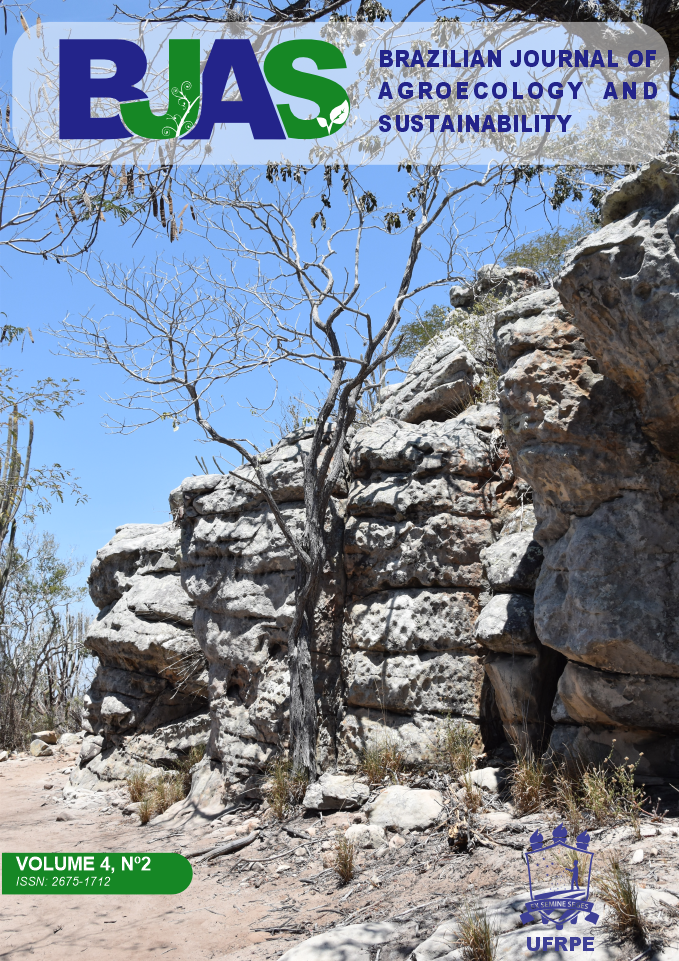Creole Seed Network of the Southern Agreste of Pernambuco - SEMEAM Network: History, Trajectory and Performance
DOI:
https://doi.org/10.52719/bjas.v4i2.5387Keywords:
Peasant Autonomy, Plant genetic resources, family farming, agroecologyAbstract
The Creole Community Seed Banks (BCS) stand out as movements that conserve agrobiodiversity and promote the perpetuation of local and traditional knowledge. Creole seeds are considered part of the genetic and cultural heritage of traditional and peasant peoples, who resist with their knowledge that descend from the beginnings of the practice of food cultivation. The formation of networks of struggle has been growing in recent years, opening space for socialization of experiences in political, economic and academic debates. This article aims to compile and share the trajectory of the SEMEAM Network (Rede de Sementes Crioulas do Agreste Meridional de Pernambuco) through the report of its actions and performances. Data collection was carried out through unstructured interviews with two people who were present at the founding of the network and are active in the articulation until the present day. In addition, electronic searches were performed on the organization's social networks and Google. The development was divided into 8 topics, alluding to the 8 years of existence of the SEMEAM Network. In this route, the events developed by the network stand out, such as the Crioula Seed Seminars and the Crioulo Seed Exchange Fairs. In addition, participatory research, the creation of new BCS, the commercialization of Creole production and experimentation in the field of communication were also highlighted. In these years of existence, the SEMEAM Network has, through its actions and performance, contributed to the animation and articulation of territories around the theme of conservation and use of local and traditional seeds.Downloads
References
Balensifer, P. H. M., & Silva, A. P. G. (2016). Metodologia para formação de bancos
comunitários de sementes (p. 32). Recife: Instituto Agronômico de Pernambuco.
http://www.ipa.br/novo/pdf/metodologia-para-formacao-de-bancos-comunitarios-desementes.
Balensifer, P. H. M., Silva, A. G., & Souza, N. L. O. (2018). Levantamento de variedades
crioulas cultivadas por agricultores familiares do Agreste Meridional de Pernambuco.
I Seminário de Agroecologia do IFPE. Belo Jardim: IFPE.
Brasil. (1994). Decreto Legislativo n. 2 de 03/02/1994. Aprova o texto do Convenção sobre
Diversidade Biológica, assinada durante a Conferência das Nações Unidas sobre Meio
Ambiente e Desenvolvimeto, realizada na Cidade do Rio de Janeiro, no período de 5 a
de junho de 1992. https://www2.camara.leg.br/legin/fed/decleg/1994/decretolegislativo-2-3-fevereiro-
-358280-publicacaooriginal-1-pl.html
Brasil. Constituição. (2003). Lei n. 10.711, de 05 de agosto de 2003. Dispõe Sobre O Sistema
Nacional de Sementes e Mudas e dá Outras Providências. Casa Civil.
http://www.planalto.gov.br/ccivil_03/leis/2003/l10.711.htm#:~:text=Art.,em%20todo
%20o%20territ%C3%B3rio%20nacional.
Castro, J. A. (1984). Geopolítica da fome. (Vol. 1, 10a ed. pp. 279-305). Editora Antares.
https://files.cercomp.ufg.br/weby/up/473/o/CASTRO__Josu%C3%A9_de_-
_Geografia_da_Fome.pdf
Comitê Gestor da Internet no Brasil. (2018). TIC domicílios 2017: Pesquisa sobre o uso das
tecnologias de informação e comunicação no Brasil.Comitê Gestor da Internet no Brasil.
https://www.cetic.br/media/docs/publicacoes/2/tic_dom_2017_livro_eletronico.pdf
Grígolo, S. C., Diesel, V., & Dornelles, C. P. N. (2016). A festa das sementes crioulas
como subversão do agronegócio. In S. J. Sarandón, & E. A. Abbona (Orgs.). Trabajos
científicos y relatos de experiencias: La agroecología, un nuevo paradigma para
redefinir la investigación, la educación y la extensión para una agricultura sustentable.
http://sedici.unlp.edu.ar/handle/10915/52154
Brazilian Journal of Agroecology and Sustainability, Volume 4, Nº2, ISSN 2675-1712
Mattos, P. L. (2005). A entrevista não-estruturada como forma de conversação: Razões e
sugestões para sua análise. Revista de Administração Pública, 39, 823-84.
https://bibliotecadigital.fgv.br/ojs/index.php/rap/article/view/6789 Organização das
Nações Unidas. (2015). Transformando Nosso Mundo: A Agenda 2030 para o
Desenvolvimento Sustentável. https://brasil.un.org/sites/default/files/2020-
/agenda2030-pt-br.pdf.
Rede SEMEAM. (2019). Boletim Informativo O Batité (Vol. 1, 1a ed. pp.1-2). Rede de
Sementes Crioulas do Agreste Meridional de Pernambuco.
Rede SEMEAM. (2022). Regimento Interno da Rede de Sementes Crioulas do Agreste
Meridional de Pernambuco.
Santos, B. D. S. (2007). Para além do pensamento abissal: das linhas globais a uma ecologia de
saberes. Novos estudos CEBRAP, 71-94.
Downloads
Published
How to Cite
Issue
Section
License
Copyright (c) 2022 Brazilian Journal of Agroecology and Sustainability

This work is licensed under a Creative Commons Attribution-NonCommercial-ShareAlike 4.0 International License.





